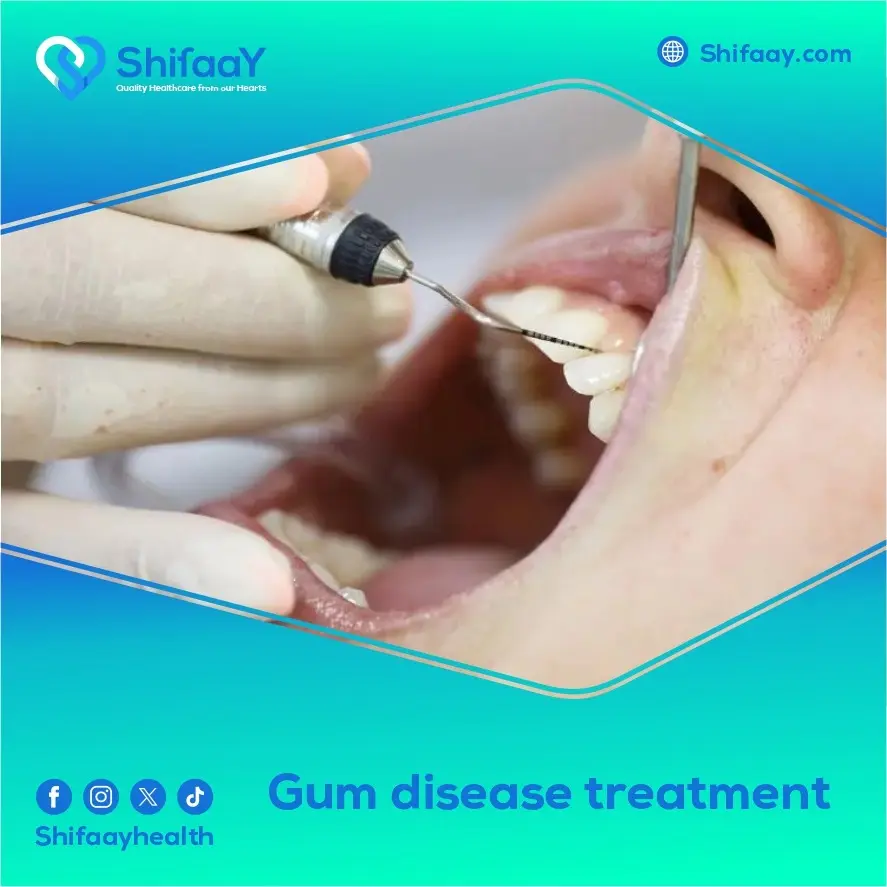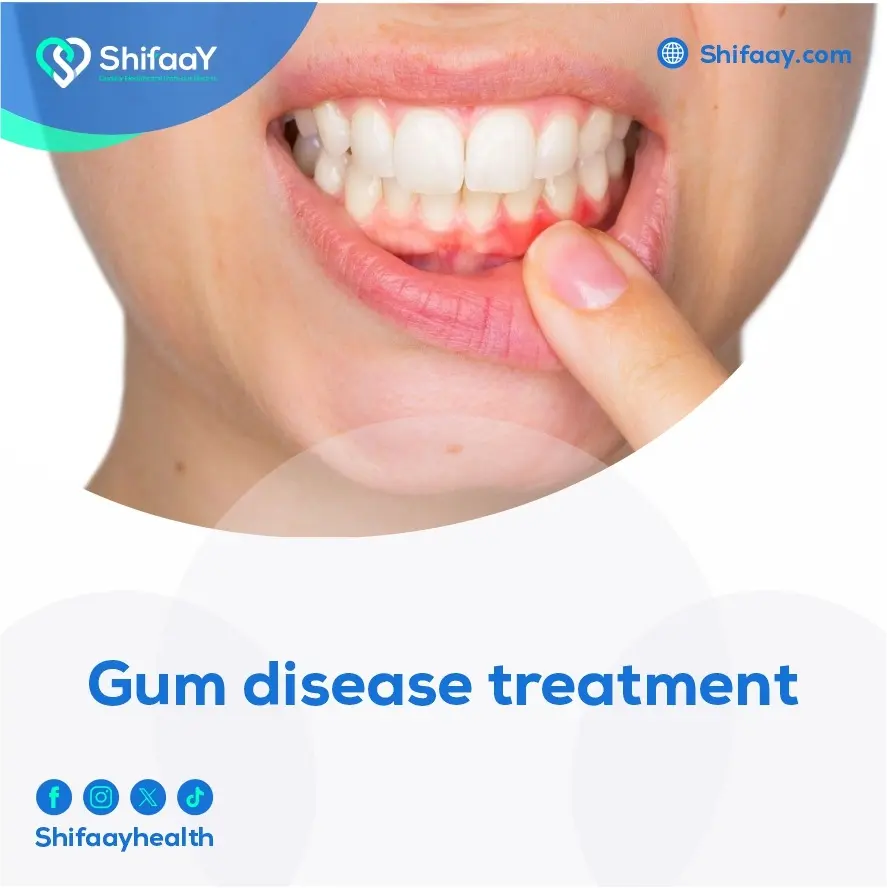gum disease treatment and teeth
Your smile is the secret to your beauty and a reflection of your health, but it loses its shine when gum disease appears — one of the most common oral health problems that many people suffer from without realizing its impact on the health of their mouth and teeth. The main cause of this condition is the accumulation of bacteria and tartar around the teeth, leading to redness, swelling, and bleeding of the gums during brushing, which may eventually result in gum weakness or even tooth loss. Therefore, it is essential to address the problem as soon as it appears to maintain oral health.
When it comes to effective and ideal ways to relieve symptoms, gum disease treatment always begins with simple daily care at home. Rinsing with warm salt water can help soothe the inflammation, while using a soft-bristled toothbrush, dental floss, and antiseptic mouthwash regularly can reduce bacterial buildup and ease the inflammation. In more advanced cases, the dentist may recommend professional scaling to remove tartar or prescribe medications to strengthen the gums and reduce swelling. Additionally, a healthy diet rich in vitamin C plays a vital role in supporting gum healing and enhancing its natural immunity against infections.
The key to success in gum disease treatment lies not only in temporary relief but also in consistent daily care and regular follow-ups with the dentist to maintain long-term results. For the best care and an accurate diagnosis, we recommend visiting the best dentist in Egypt at Shifaay Center, where you can receive a comprehensive treatment plan that helps restore your gum health, your smile’s beauty, and your confidence every day.
Treatment of Gum Inflammation and Swelling

The treatment of gum inflammation and swelling is one of the most concerning issues for many individuals. Gum pain and swelling are not just minor symptoms — they are clear signs of underlying inflammation that require immediate care before worsening. The symptoms usually begin with redness and swelling of the gum tissue, accompanied by slight bleeding during brushing or eating. If neglected, the condition can progress to chronic pain and difficulty chewing or speaking. Therefore, many people seek safe and effective ways to treat gum inflammation without resorting to surgical procedures, especially in the early stages, where it can be easily controlled with proper daily oral hygiene.
The first step in treating gum inflammation and swelling starts at home with meticulous oral care — brushing twice daily using a soft toothbrush and toothpaste containing antibacterial agents, rinsing with warm salt water to calm the inflammation and reduce swelling, and using dental floss to remove food debris unreachable by the brush. It is also advised to use antiseptic mouthwash to maintain oral hygiene and limit bacterial growth. In advanced cases, visiting a dentist is essential for tartar removal or prescribing suitable antibiotics to treat the infection and improve gum health effectively.
A healthy diet also plays a major role in promoting oral health and recovery. Consuming foods rich in vitamin C helps strengthen the gums and accelerate tissue repair. For those seeking professional, precise care, the best dentist in Egypt is the ideal choice thanks to extensive expertise in treating gum diseases using the latest medical technologies. Furthermore, patients from abroad can combine treatment with relaxation through the medical tourism services in Egypt, offered by Shifaay Center, providing a comprehensive treatment experience that merges outstanding healthcare with comfort and luxury.
Read aslo: Fixed Teeth Prices in Egypt
Causes of Gum Inflammation and Swelling
Gum health is an essential part of overall oral health, as neglecting it can lead to chronic problems affecting the teeth and surrounding tissues. Gum inflammation and swelling are among the most common oral issues, often resulting from daily habits or internal body factors. The most prominent causes include tartar buildup, severe tooth decay, hormonal changes, and poor oral hygiene. Below are the main causes of gum inflammation and swelling and how they impact gum health:
- Tartar and Plaque Buildup
The accumulation of plaque and tartar on the teeth causes gum inflammation and swelling. Food particles and bacteria form a sticky film on the teeth, which hardens over time into tartar that irritates the gums and causes bleeding. It also weakens the attachment between the gums and teeth, leading to gradual gum recession. - Severe Tooth Decay
Severe tooth decay is a major cause of gum inflammation and other oral issues. Bacteria produce acids that erode the tooth enamel and spread to the gums, causing infection and discomfort. If left untreated, decay can reach the roots, making the gums more sensitive and swollen. Therefore, early treatment of cavities is crucial to protect both teeth and gums.
- Hormonal Changes
Hormonal fluctuations greatly affect gum sensitivity and inflammation, especially in women during pregnancy, menstruation, or puberty. Elevated hormone levels increase blood flow to the gums, making them more prone to swelling and bleeding. Hence, extra oral care is recommended during these periods to minimize the effects of hormonal changes.
- Poor Oral Hygiene
Neglecting oral hygiene is one of the leading causes of gum inflammation and swelling. The buildup of food debris and plaque encourages harmful bacterial growth, which over time irritates the gums and erodes surrounding tissues. Therefore, brushing twice daily, using dental floss, and rinsing with antiseptic mouthwash are essential to maintaining healthy gums.
Symptoms of Gum Inflammation
Gingivitis is one of the most common oral and dental problems, often resulting from bacterial accumulation or neglecting daily oral hygiene. Symptoms usually start mildly and may go unnoticed at first but gradually worsen, leading to noticeable discomfort and pain while eating or brushing teeth.
The real danger of gingivitis lies in the fact that, if left untreated, it can progress to complications that affect the teeth and the supporting tissues.
Below are the most common symptoms of gingivitis that should be recognized and treated promptly:
- Redness of the gums: The gums appear more reddish than the normal healthy pink color.
- Swelling and inflammation: The gums become swollen and tender to the touch.
- Bleeding gums: Occurs while brushing or flossing.
- Persistent bad breath: Caused by bacterial buildup in the mouth.
- Gum recession: The gums pull away from the teeth, exposing more of the roots.
- Pain or gum sensitivity: Especially when eating or drinking.
- Tooth mobility in advanced stages: Due to weakened supporting tissues.
Methods of Treating Gum Inflammation and Swelling
Gum inflammation and swelling are among the most common oral issues, usually resulting from plaque and tartar buildup or neglecting oral hygiene.
Symptoms appear as redness, swelling, and pain in the gums, sometimes accompanied by bleeding during brushing or chewing.
Neglecting treatment may worsen the condition, leading to gum recession or even tooth loss over time.
Therefore, it is crucial to know the proper gum disease treatment methods and maintain healthy habits to prevent recurrence.
Treatment depends on the severity of the case and may include:
- Proper oral cleaning: Use a soft-bristled toothbrush and fluoride toothpaste twice daily.
- Flossing: Remove food debris between the teeth.
- Saltwater rinse: Helps reduce inflammation and bacteria, soothing the gums.
- Antiseptic mouthwash: Such as chlorhexidine or herbal rinses to limit bacterial growth.
- Dental visit: For professional plaque and tartar removal.
- Medications: Antibiotics or pain relievers in severe cases.
- Healthy lifestyle: Quit smoking and eat foods rich in vitamin C to support gum health.
Medications for Gum Inflammation
Many people experience sudden gum pain or swelling, prompting them to look for quick relief before visiting a dentist.
There are several home and medical options that provide temporary comfort and help maintain oral health until full treatment is obtained.
Medications vary depending on the severity of the condition and include:
Antibiotics: Used in cases of severe bacterial infection or abscess, such as:
Amoxicillin, Metronidazole
Pain relievers and anti-inflammatory drugs: To reduce pain and swelling, such as:
Ibuprofen, Paracetamol
Antiseptic mouthwashes: Help eliminate bacteria and reduce inflammation, such as:
Chlorhexidine mouthwash, herbal antibacterial rinses
Medicated toothpastes: Strengthen gums and inhibit bacterial growth, such as:
Fluoride toothpaste, herbal anti-inflammatory pastes
However, a dentist’s consultation is essential before taking any of these medications.
Best Ointments for Gum Inflammation
Gingivitis is a common oral condition that causes gum swelling, pain, and even bleeding during brushing.
To overcome this issue, identifying the underlying cause—such as tartar buildup or bacterial infection—is crucial.
Maintaining daily oral hygiene with proper brushing and flossing reduces residue accumulation.
Antiseptic mouthwashes and mild painkillers can help soothe inflammation, while advanced cases may require a dentist’s supervision for antibiotics or deep cleaning procedures.
Here are some of the best topical gels and ointments used in gum disease treatment:
- Gengigel: Contains hyaluronic acid; soothes gums, reduces inflammation, and combats bacterial and fungal growth.
- Oracure Gel: Contains lidocaine; relieves pain while inhibiting bacterial and fungal growth in the mouth.
- Curaprox Gel: Rich in chlorhexidine, a potent antibacterial used in severe gingivitis cases.
- Daktarin Gel: Contains miconazole; effectively treats fungal infections in the mouth and gums.
- Neosimly Gel: Contains menthol; helps calm the gums, reduce swelling, and control bleeding associated with inflammation.
Best Gel for Gum Disease Treatment
Dental gels are among the most effective methods used for gum disease treatment, as they help soothe pain, reduce swelling, and relieve redness associated with inflammation. The choice of gel depends on its active ingredients, since the therapeutic strength varies from one product to another based on its composition.
It is important to note that there is no single gel that can be considered the absolute best, as the most suitable one differs depending on the patient’s condition and the severity of the inflammation. Among the best and most reputable gels for gum disease treatment are:
Oracure Gel: Helps relieve pain and quickly reduce inflammation.
Gengigel: Contains natural extracts that promote gum healing.
Daktarin Oral Gel: Effective against fungal infections that may affect the gums.
Goggel Gel: Designed for mild to moderate oral inflammations and provides gum protection.
Dentinox Teething Gel: Useful for children to relieve teething pain and associated inflammation.
Periokin: Helps strengthen the gums and improve overall oral health.
These gels should be used as part of a consistent oral hygiene routine—brushing twice daily and using dental floss to prevent plaque and tartar buildup—which enhances the gel’s effectiveness and prevents recurrence of inflammation.
Treatment for Gum Swelling Around a Molar with Pain
If you experience swelling of the gums around a molar accompanied by persistent pain, this is a common condition that can cause discomfort while chewing or speaking. It often results from bacterial accumulation beneath the gums or tartar and food debris buildup.
Treatment begins with identifying the underlying cause of the swelling. It may be a mild inflammation manageable at home or a condition requiring professional dental care. Maintaining daily oral hygiene with proper brushing and flossing helps reduce inflammation, while antiseptic mouthwashes soothe pain and swelling and provide quick relief.
The main gum disease treatment steps for swelling around a molar include:
- Removing plaque and bacteria accumulated on the tooth surface and beneath the gums, and smoothing the tooth roots to prevent further buildup—this accelerates healing.
- Tooth restoration to facilitate cleaning and minimize gum inflammation.
- Using antibiotics to treat infections associated with dental abscesses and control inflammation.
- Root canal therapy, which involves cleaning infected tooth roots to eliminate bacterial infection.
- Tooth extraction in severe cases, usually performed under local anesthesia.
- Regular follow-ups with a dentist to ensure gum and dental health.
Treatment for Gum Swelling Above a Molar
Swelling of the gums above a molar is a common issue that causes discomfort and sometimes pain while chewing or speaking. It usually results from bacterial accumulation, tartar, or food debris between the teeth and gums, and may worsen due to poor nutrition or improper oral hygiene habits.
To manage and prevent this issue, it is recommended to follow these simple and effective steps:
- Brush your teeth twice daily.
- Rinse with warm salt water several times a day to reduce inflammation and promote healing.
- Stay hydrated, as water stimulates saliva production, which helps neutralize harmful bacteria in the mouth.
- Avoid strong mouthwashes, alcohol, and tobacco, as they can irritate the gums and worsen swelling.
- Eat a balanced diet rich in fruits and vegetables—nutritional deficiencies can contribute to gum swelling.
- Avoid sugary foods and drinks, which increase tartar buildup and gum disease risk.
- Avoid foods that get trapped between the teeth and gums, such as popcorn and potato chips.
- Visit your dentist regularly, since routine check-ups help detect and treat gum or dental problems early.
- By following these preventive measures, you can significantly reduce the risk of gum swelling above a molar.
Treatment for Gum Swelling Around a Wisdom Tooth
Gum swelling around a wisdom tooth is a common issue that causes discomfort and pain while eating or talking. It often occurs due to bacterial accumulation or poor daily oral hygiene, and neglecting it can lead to more serious infections if left untreated.
Fortunately, symptoms can be relieved in the early stages with simple methods that help soothe the gums and temporarily reduce swelling until professional treatment is obtained.
Steps to follow:
- Rinse with warm salt water two to three times daily to reduce swelling and kill bacteria temporarily.
- Apply cold compresses for 10–15 minutes to reduce pain and inflammation.
- Take pain relievers such as paracetamol or ibuprofen.
- Avoid smoking, hot or spicy foods, and drink enough water.
- Eat foods rich in Vitamin C to promote gum healing.
- Maintain oral hygiene using an antibacterial mouthwash.
Home Remedies for Gum Swelling Above a Molar
Home remedies for gum swelling above a molar are often sought because this condition causes discomfort and pain while eating or talking. It typically results from food debris or bacterial buildup in the gum area, leading to inflammation and swelling.
In the early stages, this can be controlled with simple and safe home methods that help reduce pain and swelling, provided daily oral hygiene is maintained.
The most effective home remedies include:
Warm saltwater rinse:
Use it several times daily as it helps disinfect the mouth and reduce inflammation and swelling.
Cold compresses:
Apply on the outer cheek for 10–15 minutes to relieve swelling and irritation.
Avoid irritating foods:
Stay away from hard or spicy foods that can worsen gum irritation and pain.
Use natural aloe vera gel:
Apply a small amount directly to the affected area to soothe the gums thanks to its antibacterial and calming properties.
Brush with a soft toothbrush:
This helps maintain cleanliness without causing additional pain or injury.
Consult your dentist if symptoms persist:
If swelling or pain worsens, seek medical attention to prevent complications such as abscesses or infections.
Consulting the best dentist in Egypt ensures accurate diagnosis and effective gum disease treatment that preserves gum health and maintains a bright smile.
How long does gum disease treatment take?

This question is frequently asked by individuals suffering from oral and gum problems, as many people seek an effective and quick way to eliminate inflammation and restore the health of their smile. The treatment journey begins from the moment the condition is diagnosed — the earlier it’s detected, the easier and shorter the recovery period will be.
Mild cases of gum inflammation may improve within one week to ten days with proper oral hygiene and care, while advanced cases that require scaling, root planing, or medication may take several weeks for complete healing, depending on the severity of inflammation and the body’s response to treatment.
The duration of gum treatment largely depends on the patient’s commitment to daily oral care routines, such as brushing twice a day, using dental floss and antiseptic mouthwash regularly, avoiding smoking and irritating foods. Continuous follow-up with the dentist also plays a crucial role in preventing the condition from progressing into severe and deep gum inflammation.
Successful treatment is not limited to medication alone—it also involves correcting bad oral habits and maintaining consistent oral hygiene.
Therefore, to achieve the best results, it is recommended to consult the best dentist in Egypt at Shifaay Center, known for their high expertise and exceptional skills in treating gum inflammation using the latest and safest medical techniques.
Treating gum disease is not merely a temporary medical step; it is a true investment in oral and dental health, ensuring a bright, pain-free smile and protection against future complications.
How can I get rid of gum inflammation at home?
To treat gum inflammation at home, you should:
- Brush your teeth daily using both a toothbrush and dental floss.
- Use an antiseptic mouthwash or a saltwater rinse.
- Eat foods rich in vitamin C.
- Avoid smoking completely.
If the inflammation persists, consult your dentist immediately.
What is the best medicine for gum inflammation?
The best medication for gum inflammation is an antiseptic mouthwash, such as chlorhexidine, combined with a mild pain reliever and, if necessary, an antibiotic prescribed by the dentist. Daily oral hygiene remains essential for recovery.
What is the best antibiotic for gum inflammation?
The most effective antibiotic for gum inflammation is Amoxicillin, and in more severe cases, Metronidazole may be prescribed. However, you must always consult your dentist before taking any antibiotic.
What is the main cause of gum inflammation?
The primary cause of gum inflammation is the accumulation of bacterial plaque on the surface of the teeth and along the gumline. This thin layer forms from bacteria and food debris, and if not removed regularly, it can irritate the gum tissues, leading to redness, swelling, and bleeding while eating or brushing.






